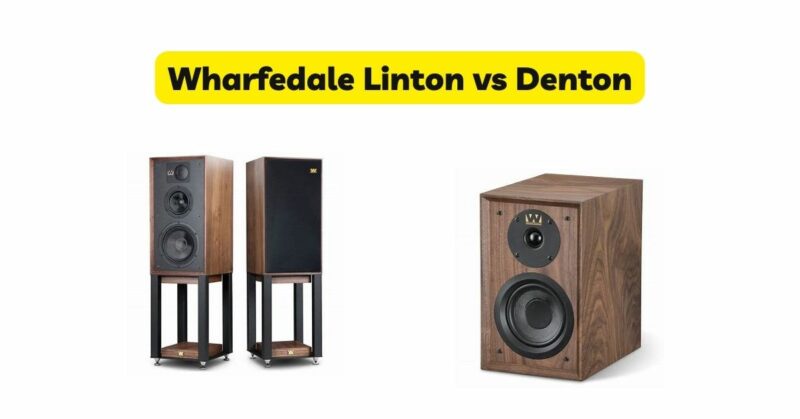Bookshelf speakers have long been favored by audio enthusiasts for their compact size and impressive sound performance. In this article, we will compare two iconic bookshelf speakers: the Wharfedale Linton and the Denton. Both speakers offer a classic design and deliver exceptional audio quality. We will explore their design, performance, features, and overall value, allowing you to make an informed decision based on your preferences and listening requirements.
Design and Build Quality:
The Wharfedale Linton and the Denton both boast a classic design that exudes timeless elegance. The Wharfedale Linton features a wooden veneer cabinet with rounded edges and a removable grille, giving it a vintage charm. The Denton, on the other hand, showcases a retro-inspired aesthetic with its vinyl-wrapped cabinet and front-facing grille. Both speakers are built with meticulous attention to detail and sturdy construction, ensuring durability and longevity.
Driver Configuration and Technology:
The Wharfedale Linton utilizes a 2-way driver configuration, comprising a 6.5-inch woven Kevlar bass driver and a 1-inch soft-dome tweeter. This combination allows for accurate and balanced sound reproduction across the frequency range. The Denton, on the other hand, also employs a 2-way driver configuration, featuring a 5.25-inch woofer and a 1-inch tweeter. While slightly smaller in size, the Denton’s drivers are carefully engineered to deliver precise and detailed audio performance.
Sound Performance:
Both the Wharfedale Linton and the Denton excel in delivering impressive sound quality despite their compact size. The Linton produces a warm and immersive sound signature, with a controlled bass response, detailed midrange, and smooth high frequencies. It creates a wide soundstage, allowing the listener to experience the music in a spacious and enveloping manner. The Denton, though smaller in stature, surprises with its ability to reproduce a well-balanced sound. It offers a tight and punchy bass, clear midrange, and crisp treble, providing an enjoyable listening experience.
Bass Response:
The Wharfedale Linton’s 6.5-inch bass driver delivers a controlled and articulate bass response. It provides sufficient depth and impact, ensuring a solid foundation for various genres of music. The Denton, with its slightly smaller 5.25-inch woofer, still manages to impress with its bass performance. It offers a tight and controlled low end, suitable for smaller rooms or those who prefer a more balanced sound.
Midrange and Treble Clarity:
Both the Wharfedale Linton and the Denton excel in reproducing clear and detailed midrange and treble frequencies. The Linton’s midrange driver offers excellent vocal reproduction and instrument separation, allowing for a natural and engaging listening experience. The soft-dome tweeter complements the midrange with smooth and extended high frequencies. The Denton’s midrange is also well-balanced, providing accurate and lifelike representation of vocals and instruments. The tweeter ensures crisp and detailed treble response, adding sparkle and airiness to the sound.
Amplification and Power Handling:
The Wharfedale Linton has a nominal impedance of 6 ohms and a recommended amplifier power range of 25-200 watts. It can be easily driven by a variety of amplifiers, making it compatible with a wide range of systems. The Denton has a nominal impedance of 8 ohms and a recommended amplifier power range of 20-120 watts. While it requires slightly less power, it still performs well with a variety of amplifiers, offering flexibility in system pairing.
Additional Features:
The Wharfedale Linton features bi-wire terminals, allowing separate connections to the bass and treble sections of the speaker. This allows for customization and fine-tuning of the sound based on personal preferences. The Denton, although more minimalist in terms of additional features, focuses on delivering high-quality audio performance without unnecessary frills.
Value for Money:
Both the Wharfedale Linton and the Denton offer excellent value for money, considering their design, performance, and overall audio quality. The Linton provides a classic aesthetic, immersive sound, and flexibility in system pairing. It appeals to audiophiles seeking a vintage-inspired bookshelf speaker with modern audio capabilities. The Denton, on the other hand, offers a compact form factor, impressive sound performance, and a retro design that resonates with enthusiasts looking for a blend of nostalgia and audio excellence.
Conclusion:
In comparing the Wharfedale Linton and the Denton, it is clear that both speakers are exceptional choices in the bookshelf speaker category. The Linton impresses with its warm and immersive sound, elegant design, and flexibility in system pairing. It caters to those who value a vintage aesthetic without compromising on modern audio quality. The Denton, with its compact size, accurate sound reproduction, and retro-inspired design, offers a delightful audio experience suitable for smaller spaces or those who prioritize a balanced sound signature. Ultimately, the choice between the two will depend on personal preferences, room size, and the desired listening experience. Regardless of the decision, both the Wharfedale Linton and the Denton are excellent options that deliver outstanding audio performance and make a valuable addition to any audio setup.


